By Rakashi Chand, Reading Room Supervisor
The MHS celebrated AAPI Heritage Month with a special event featuring material from our collections related to the Asian American Pacific Islander Histories including manuscripts, art, maps, and artifacts. As a segue to the arts and culture brought to the Commonwealth by AAPI communities, we were honored to have Bharatanatyam dancer Janani Ganesh of Newton, Mass. perform a classical dance from India to begin the program. The welcome dance was followed by guest speaker Yasmin Padamsee Forbes, Executive Director of the Massachusetts Asian American Pacific Islander Commission, who spoke about the importance of AAPI Voices in both historic and current contributions to the fabric of Massachusetts culture and identity, as well as the need for advocacy of our AAPI communities.

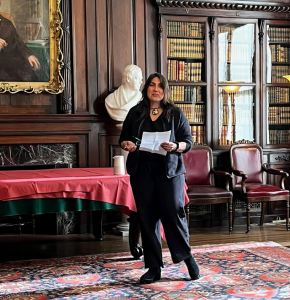
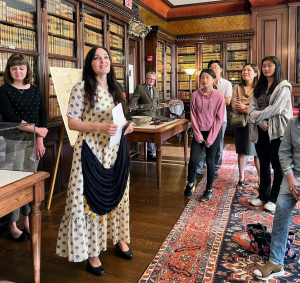
Below are a few examples of the items exhibited and discussed during the event by MHS Chief Historian Peter Drummey and Reading Room Supervisor and AAPI community leader Rakashi Chand.
Harbor at Hong Kong, attributed to Lam Qua, [1850s]
This oil painting of the harbor at Hong Kong is attributed to Lam Qua, a 19th-century artist from the Canton province in China. Also known for his portraits of Western and Chinese merchants, as well as medical subjects, Lam Qua was one of the first Chinese painters exhibited in the West. For further reading about this painting and a companion view of the Harbor of Macao, visit www.masshist.org/database/2277.
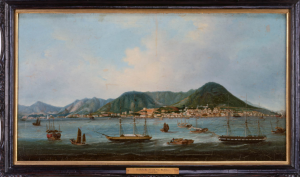
Grand Chop of the ship Astrea
Grand chop, or permit, issued to the ship Astrea in Guangzhou (Canton), China, January 1790. The Grand Chop permitted the ship and its cargo to leave the anchorage at Huangpu Qu (Guangzhou Shi, China). To learn more, visit www.masshist.org/database/2519.
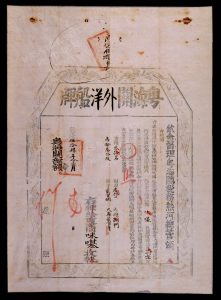
Banquet to the Ambassadors of Japan, by Members of the Boston Board of Trade: Bill of Fare, broadside on silk, 2 August 1872
After Commodore Matthew Perry’s Mission of Peace and Goodwill opened commerce with Japan, an Embassy or mission lead by Iwakura Tomomi visited Europe and America to improve the unequal terms given to Japan by Western countries and to learn about the West. In 1872 Boston, the Boston Board of Trade hosted a lavish banquet at the Revere House with speakers including Ralph Waldo Emerson and Dr. Oliver Wendell Holmes. The latter composed a poem for the occasion that begins with the line, “We welcome you, Lords of the Land of the Sun!” Learn more at www.masshist.org/database/2707.
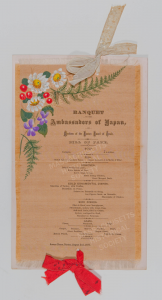
Rabindranath Tagore to Ellery Sedgwick, 12 October 1930
In this letter dated 12 October 1930, Rabindranath Tagore writes to Ellery Sedgwick as a friend seeking guidance on how to handle the American media. In this letter, Tagore reveals his thoughts not only about his experience of coming to America, but what he feels as an Indian in America at that moment in time trying the grasp and understand American culture. Read more in this blog post.

Massachusetts Oct. 12, 1930
My Dear Mr. Ellery Sedgwick,
Some time ago while travelling in Europe I got your letter and in a fury of movement I completely forgot that I had not answered it. Can you forgive me?
I hope I shall be able to elbow my way to a meeting with you while I am here and shall have the opportunity of a talk. In the meanwhile I ask your friendly advice in my present state of helpless bewilderment. Let me state my case in brief.
Directly my steamer came to the dock in New York, my cabin was invaded by a host of strangers before I could guess their intention and adequately prepare myself for the attack. In my own country I am used to such unannounced and unforeseen catastrophe. We are a democratic people with our doors open to all kinds and conditions of men. My position in the world offers no barricade against intrusion into my privacy, interruption of my work or disturbance of my peace of mind. So with a spirit of resignation which has become habitual to me, I silently suffered these unexpected guests of mine to fill up all of the available space in my cabin. At first, in my pathetic vanity, I though it was deputation from some committee which tried in its own manner to express its obligation to offer me welcome at the moment of my reaching your shore. But their object was made clear to me when they brandished their pencils and notebooks and began to question me about matters that were personal to myself or that concerned my own country. I meekly accepted the inevitable decree of my fate and did my best to satisfy their curiosity in as clear a language as was in my ability to use. Let me assure you that I did not court this publicity nor did I appreciate it as a favour. However, the next day to my painful surprise I found in the first newspaper that came to my hands my words twisted to give a contrary suggestion to what I tried to convey to them. Then I came to know from my friends that several other newspapers have followed the same track of misinterpretation on questions vitally important for my people and for the cause of truth. I am sorely puzzled. I cannot ascribe this to a sudden epidemic of unintelligence among the American reporters and my vanity forbids me to think that I failed to make my meaning clear specially on points which would lead to mischief if vaguely expressed. I fully know that all earlier misinformations have the advantage over the contradictions that follow later as the wound creates a deeper impression than the bandage. And yet I did send my own original version to one of the most important of these papers and waited for its appearance on the next morning. But I find that they are not as prompt in publishing the correction as they have been in giving currency to the wrong statement. I am a simple man from the East and I hate to carry in my mind distrust against any section of your community specially the one whose duty it is to supply information to the public. I tell you truly it has made me feel afraid, for I do not know the technique of your public life and it tires me to be always on my guard. I am beginning to feel like a pedestrian from my country trying to walk in his own absent-minded manner in some busy street in New York and suddenly finding some necessary portions of his limbs disappearing in the dust. I only wish I could laugh at my misadventure, but that has become impossible even for an oriental philosopher owing to its extremely mischievous nature. I have come to the conclusion that the only place which is safe for the eastern simpleton is his own remote corner of obscurity. Waiting for some advice and consolation from you
I remain
Very sincerely yours
Rabindranath Tagore
Sent from:
Buxton Hill
Williamstown
Massachusetts

